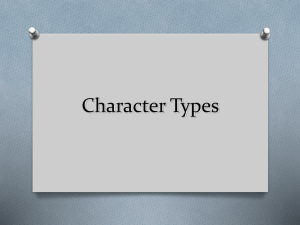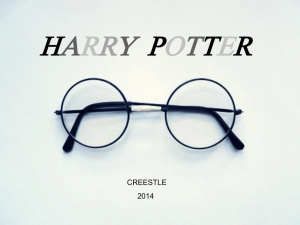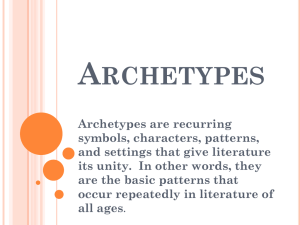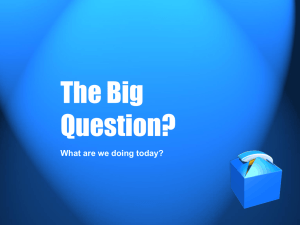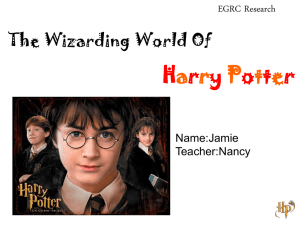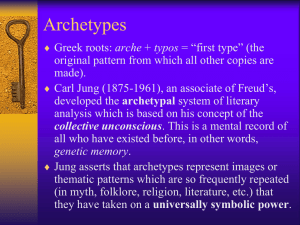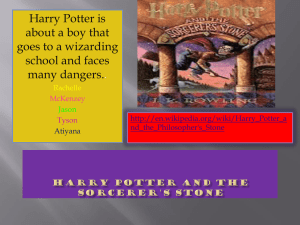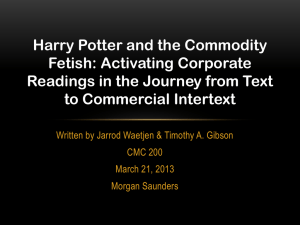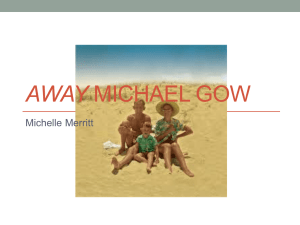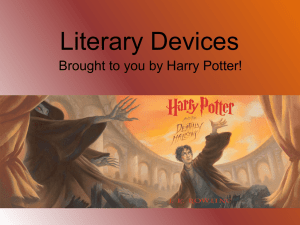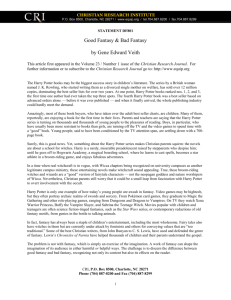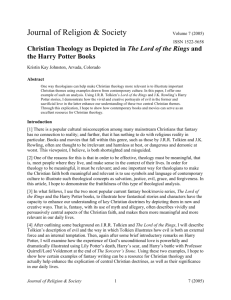What genre ?
advertisement
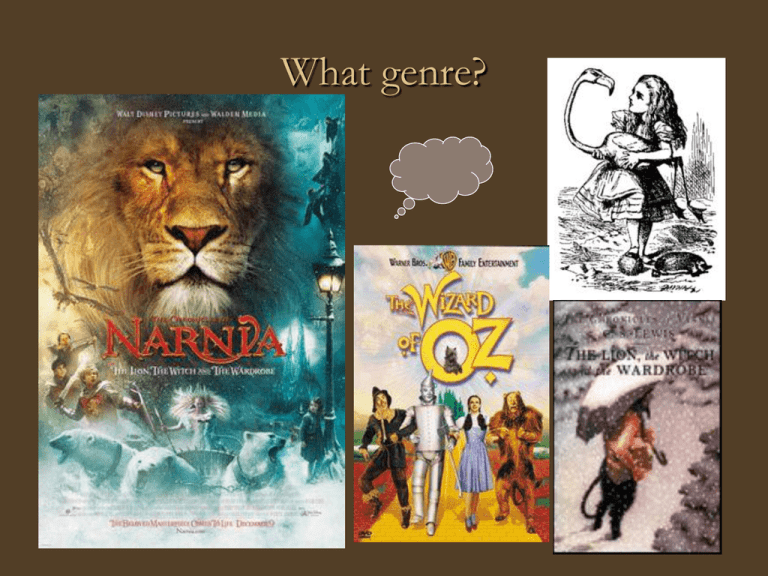
What genre? Defining ‘Fantasy’ Fantasy, a term used (in the context of children’s literature) to describe works of fiction, written by a specific author (i.e. not traditional) and usually novel-length, which involve the supernatural or some other unreal element. Good definition??? Counterarguments: – not only children read the books of Harry Potter or Lord of the Rings – quite vague terms: unreal/supernatural – no mentioning of film adaptation Good definition by Tolkien What really happens is that the story-maker proves a successful “sub-creator”. He makes a Secondary World which your mind can enter. Inside it, what he relates is “true”: it accords with the laws of that world. You therefore believe it, while you are, as it were, inside. The moment disbelief arises, the spell is broken; the magic, or rather art, has failed. Can someone explain this in his own words? We will use Lord of the Rings: The Fellowship of the Ring & Harry Potter and the Sorcerer’s Stone as case-studies The authors: Rowling and Tolkien Is this world totally different? Mimesis and Magic/ Realism vs. Fantasy Hogwarts: Harry’s school of wizardry has a Great Hall with: – normal christmas trees – normal benches – normal floors… The shire and the rest of Middle-earth can be drawn into a ‘normal’ map, has normal trees and rivers… = mimesis BUT The Great Hall seems to be having no roof and the Hobbits live in extraordinary looking houses = magic Differences Lord of the Rings Harry Potter • High Fantasy • Contemporary Fantasy • Closed world • Open world • Shift from one world to another with guide Hagrid !Movie excerpt (3’ movie 1) • Epic genre • Quest • ‘Bildungsroman’: personal quest Fantasy vocabulary • Plot: a set of connected events that a story, film, etc. is based on • Recurrence: an occasion when something that has happened before, happens again • Protagonist: the most important character • Antagonist = Opponent • Space: all of the space in which everything exists, and in which everything has a position or direction. • Mission: something you feel you must do because it is your duty. • Tension: a situation in which different needs, forces, or influences pull in different directions and make the situation difficult. • Closure/Resolution: the act of finding a way to deal with a difficulty. Similarities Both movies/books have 1/ Recurrency Plot: peace-chaos-peace 2/ Romantic Heroes: more abilities than humans but no Gods 3/ Fantastical elements: HP:Quidditch, posions, ministry of wizardry, transfiguration,… LOTR: hobbits/Nazgul/orcs/eternal life/… 4/ Included Subgenres: seriesbooks, ghost-stories and horror (excerpt smeagol turns into Gollem 3’-6’ 3rd movie) 5/ Fantastic languages: Sindarin, Quenya: elves languages + Entish (tree language)in LOTR / English-Latin magical lang. POTTER (vingardium leviosa) 6/ Foreshadowing of things to come Opposites attract? • Good versus evil: give your opinion: ‘While Good can imagine what it would look like to be Evil, Evil can not imagine what it would look like to be Good.’ • The difference is actually not that clear: !! Many characters are each others opposites: 1. Harry Potter for example has the same wand as Voldemort himself. See quote:Mr. Ollivander: It's curious that you should be destined for this wand when its brother gave you that scar. 2. A lot of Tolkien’s characters are also each others opposites: the orcs are fallen elves / Gollem vs. Smeagol/… Heroes • 1. LOTR hero(es)? Aragorn: archetypal epic hero (he is obviously courageous and destined to become King) 2. Frodo: archetypal fairy-tale hero (unlikely doer of great deeds) 3. Tolkien called Sam the chief hero: do you agree? Consider this: ‘I can’t carry the ring for you, but I can carry you’ Is Harry Potter the only hero in J.K. Rowling’s tales? Understanding LOTR Watch trailer! (movie 1) 1. 2. 3. 4. 5. 6. 7. 8. Space idyllic Shire vs. Mordor= exemplary of peace vs. Chaos Receiver (Frodo) learns about the problem of evil Dark Lord Sauron from Messenger (Gandalf) Mission/Object: “the ring must be destroyed” (tension) Hero (protagonist) gets mission 1st Gandalf/ than Galadriel “this task was appointed to you”and the community appoints “the most unlikely person imaginable” “I can not do this alone” Helpers are needed (Aragorn/Gimli/Sam/Legolas/Gandalf/Galadriel…) Opponents (antagonists): work against the hero (Sauron/Nazgul/Orks “evil that does not sleep”) Tension in space and characters: Empathy for good cause: “the ring is trying to get back to its master” At the end of the cycle the ring is destroyed: mission completed: reader wants Closure Plot exercise Mission Receiver/Hero Resolution/Closure Space Helpers Opponents Understanding Harry Potter 1. 2. 3. 4. 5. 6. Space: England of all Muggles vs. Hogwarts Hero (Harry) has two missions: achieving true identity of wizard “ you’re a wizard, Harry”+ protecting magical world from evil Voldemort because he survived him “the boy who lived” Mission: keep the Philosopher’s Stone from Voldemort otherwise V. would revive Helpers: All Gryffindor kids(Ron, Hermione,..)/Prof. Dumbledore, Prof. Snape and Prof. McGonagall/ Hagrid/… Opponents: Voldemort, the Malfoy’s, Prof. Quirell: for supporting the Dark Arts AND the Dudley’s: not accepting his identity Harry gets the stone+ wins the House Cup: everything is restored to peace Fun, fun, fun • www.dreuzels.com and www.harrypotterfreakz.com give you a lot of extra information on all things Potter. • Test your Potter knowledge: http://www.emse.fr/~yukna/harrypotter/Harryquiz.htm Sources http://en.wikipedia.org/wiki/The_Chronicles_of_Narnia_(film_series) http://en.wikipedia.org/wiki/Alice_In_Wonderland http://www.houghtonmifflinbooks.com/features/lordoftheringstrilogy/lesso ns Jackson, Peter, The Lord of the Rings trilogy. Columbus, Chris,Harry Potter and the Philosopher’s Stone. Rowling, J.K., Harry Potter and the Philosopher’s Stone.Bloomsbury, 1997. Verhaegen, Melissa, The story that lived. Onuitgegeven scriptie 2006. Keunen, Bart, Tijd voor een verhaal. Gent, Academia Press 2005, p.179.


